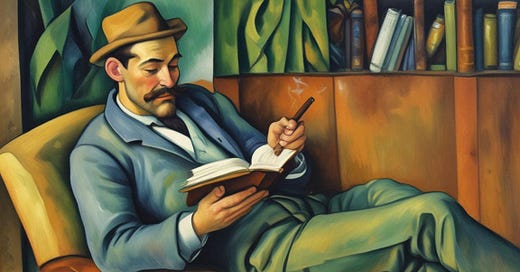“A reader lives a thousand lives before he dies, said Jojen. The man who never reads lives only one.”— George R.R. Martin, A Dance with Dragons
We had finished our business. I asked Anas, the sales representative for a Spanish tiles manufacturer, what he did outside work. He quickly replied that he read avidly.
I was taken aback. Not many people in the business world around me read something I find frustrating when socialising.
He explained how his father set him early on the path of reading. Starting when Anas was eight years old, his father would give him a book every month, a literary one—Camus, Tolstoy, Faulkner, etc—and expected him to summarise it over dinner. He told me how he hated the practice at first but was incredibly thankful now.
Reading had opened his mind to life.
We spent the next few hours discussing many books we’d read. What amazed me most was his literary understanding and how he grasped the writer’s intentions. He quickly recognised the underlying themes with which great writers subtly leave their readers. I still grapple with this even after doing one year of my two-year MFA program for creative writing.
I regret not challenging my kids to read a book a month when they were younger. However, taking inspiration from Anas’ story, I’ve now thrown down the gauntlet. I’ve asked them to read any book of their choice, and we’ll sit down (or Zoom) once a month to review what we got out of it.
Fewer people read these days, but reading is one of the few non-digital gifts we can still enjoy. We can’t allow the fast pace of modern life to paralyse us, locking us into a robotic, linear lifestyle enslaved by technology and an instant gratification mindset.
Reading is a superpower.
Oprah Winfrey says, “What I love most about reading—it gives you the ability to reach higher ground. A world of possibilities awaits you. Keep turning the page.
Warren Buffet was once asked about the secret to his success in finance. Holding a stack of papers and reports, he replied, “Read 500 pages like this every day. That’s how knowledge works. It builds up, like compound interest. All of you can do it, but I guarantee not many of you will do it.”
Bill Gates reads a book a week.
Elon Musk is a voracious reader and, growing up, often read two books a day.
The benefits of reading in my latter years have been twofold. Reading has made me a better person and taught me to be more mindful and intentional about everything I do.
When we sit alone with a good book, our mind wanders and wonders into different worlds we haven’t seen or heard of.
I remember when I read Shantaram by Gregory David Roberts. His vivid portrayal of life in Bombay and the sense of community, the locals, felt even in the direst circumstances fascinated me and kept me turning pages.
It was as if I lived there for the two weeks it took me to finish the book. I was walking the streets of Mumbai at night. I was Linbaba for a while. And who could forget the mysterious Swiss woman with lines like, “My body was her chariot, and she drove it into the sun. Her body was my river, and I became the sea.”
Reading is also meditative. We automatically switch off the chattering mind and focus all our energies on reading the lines on the page before us. It may be difficult to concentrate at first, but then the prose pulls us into the story. We become lost in the details, and somehow, all our worrisome thoughts disappear.
I’ve recently started “deep reading” for twenty minutes every morning before I do anything else. I will read Rumi, Gibran, or a sacred text like the Bhagavad Gita. I’ve been doing this for a month now, and I’ve found it calming and reassuring as if I’m connecting to my soul in those quiet morning moments.
Completing a book is a great discipline as well. Finishing a book takes perseverance and commitment in our “ADD” world. It sends a message to our psyche and others that we are determined and can achieve what we intend to do.
I’ve committed to reading a book a week for the past five years. I haven’t always been successful, but I’ve enjoyed having the self-control to avoid social events or meaningless activities to pursue my goal. I now take my book/kindle everywhere I might have to wait; when I feel the weekly deadline looming, I’ll spend four hours on a free afternoon to make up for lost time.
Sometimes, we read for information and think we forget everything, but we don’t. The “good stuff” always sticks. Our subconscious fills up with life’s most precious details without realising it.
Books, for me, are not only a source of information but a way to escape the stresses of my life. It’s a sacred indulgence—time alone to be anyplace I choose and anyone I want.
Reading has opened my mind, exposing me to everything the world offers.
I hope to inspire many to read a book a week and that “one book a week” becomes their life slogan.






As someone who's never without a book (well, Kindle these days), I agree with everything you said Mo. I can finish a fiction book within a week ... but I find most non-fiction books usually take me a bit longer. Too much thinking, taking notes, etc. 😂
No arguments there. Reading and learning is one of the great joys of being alive.